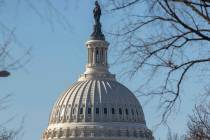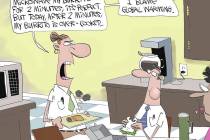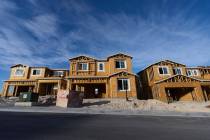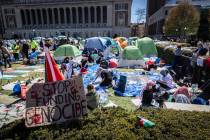Housing bailout averted catastrophe
To the editor:
Many people seem to be angry about the federal government's takeover of Freddie Mac and Fannie Mae, and the media have done little to explain the consequences of allowing those two businesses to fail. To me, the action by the government was well-justified and served to keep this country's housing crisis from becoming substantially worse.
Federal and state banking regulations impose a strict limit on the amount of money that a bank may loan out, whether it be in the form of mortgages, consumer loans, construction loans, etc. Once a bank has committed to that amount, it is legally forbidden to loan out another penny. These regulations are designed to prevent bank failures from overextended lending.
The catch in this is that home mortgages typically tie up a bank's funds for a long period of time (between 15 and 30 years). Fannie Mae was created in 1938, under President Franklin D. Roosevelt, at a time when millions of families could not become homeowners, or risked losing their homes, for lack of a consistent supply of mortgage funds across America. Freddie Mac raises capital on Wall Street and throughout the world's capital markets to finance mortgages for families across America. Over the years, Freddie Mac has made home ownership possible for one in six buyers.
Both of these businesses purchase mortgages (loans) from individual banks, thus allowing those banks to lend money to additional home buyers. If Freddie Mac and Fannie Mae were allowed to fail, there would be virtually no place for banks to sell their mortgages, and therefore the banks would quickly hit their lending limits and would be forbidden by law to lend any more money. Mortgage money would completely dry up, and no American would be able to purchase a home unless they could come up with cash to do so. With the government takeover, these two companies will continue to purchase mortgages, allowing the banking industry to continue to loan out money for housing purchases.
While it will take time, the housing market will recover. Applications for loans will be more strictly scrutinized and interest rates won't be as low as during the boom times, but the money will be available to qualified buyers.
Yes, it will cost the taxpayers some money, but far less than it would if these companies were allowed to fail.
David Adams
LAS VEGAS
Electronic experience
To the editor:
Nevada casinos are converting average customers into Internet gamblers.
Now they have electronic video poker tables with no cards, chips, felt or dealers. They already have video blackjack and roulette tables with no chips, cards, felt or dealers. The ticket-in, ticket-out slot machines with no coins, slot attendants or change personnel have been here awhile. Next will be cashless casinos -- 100 percent electronic gambling experiences, with the need for no dealers or support staff.
The casino experience will feel absolutely no different than staying at home and gambling on your computer. The question is not if, but when, gambling on the Internet will be legal -- and the big casino corporations will be right there with an Internet gambling site for your entertainment. These corporations will no longer need to spend $2 billion-plus on a brick-and-mortar casino when they will be able to do the same thing over the Internet. People will not go to a desert just to experience a nightclub with a $300 bottle of cheap whiskey, and the circus acts can travel to your city.
Casino workers, the writing is on the wall.
STEVEN GINTHER
MESQUITE
Pension politics
To the editor:
The Las Vegas Chamber of Commerce report on Nevada's Public Employees Retirement System is politics as usual, flawed from the get-go.
Your Wednesday editorial, "PERS reform," referred to a section of the report as revealing the biggest giveaway of what you call the entire "PERS scheme." It refers to the report saying PERS allows public employees near retirement to beef up their pay -- and their lifetime pension -- when supervisors conspire to help them collect extra call-back, standby, holiday, shift differential, extra duty, hazard and longevity pay in their final years of work. In truth, the PERS retirement pension is determined by base pay, and extras referenced in the report do not count toward base pay. The report is flawed.
Reno Republican Assemblyman Ty Cobb was quoted in your Tuesday news story as saying, "The idea government has to give more benefits than anyone else to attract employees is ridiculous. We ought to act like the private sector in how we run government." What private sector is Mr. Cobb referring to? Fannie Mae, Freddie Mac, Bear Stearns or maybe Enron?
The chamber should spend more time promoting businesses and helping to keep them from going under in these tough economic times and get out of the business of politics that it has been embroiled in over the past 40 years.
SAM BOWLER
LAS VEGAS























